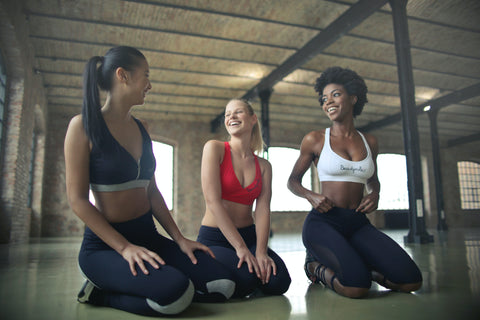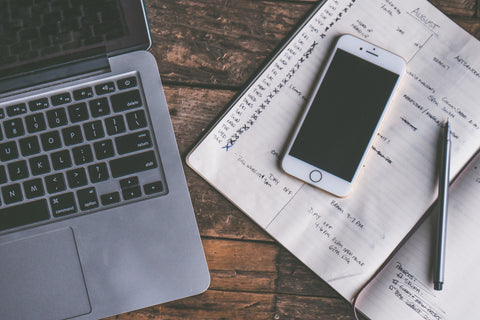Supporting your Personal Training clients in the gym comes as part of the job title, however, supporting them outside of the gym can be just as important. With an astounding 13% rise in mental health conditions in the past year, it is essential that we offer guidance, resources and support to our personal training clients.
We want to support you so, in turn, you can support your clients. We have put together some great tips in areas that are essential to focus on in your personal training, not only to support your client's fitness goals but their mental health too.
We aren't doctors, but, through offering courses in mental health support, we have gathered some tips to help you support your clients.
{If you are interested in learning more or getting qualified in Mental Health, click here}
Remember, you aren’t qualified either, always ask for help and point clients in the right direction to mental health resources, mental health charities, and The NHS free services, because every mind matters!!
{Check out the NHS mental health services website for further information}
Stick with us to see if you can incorporate these simple few steps into your sessions in hope that you may support your personal training clients better.
Table of Contents:
- Sleep: The Importance of a Good Night's Sleep
- Goal Setting: Make Them SMART
- Communication: Talking Is The Key
- Group Training: Being Part of a Team
Sleep: The importance of a Good Nights Sleep

Did you know the average adult needs between 7-9 hours of sleep a night? And hands up who doesn't get that every night? Our hands are up too, we are guilty. Sleep affects your mood, your routine, and your health. It is fundamental to a healthier lifestyle.
Asking open questions to your clients about their sleep routine will allow you to gather an understanding of how sleep affects their daily routine.
If you have personal training clients that struggle with sleep, here are a few great ways you can offer encouragement for healthier sleep patterns:
Apps:

Using sleep apps is great, they can help you fall asleep and wake up gently. From meditation to stories to calming music, they are a great tool for your clients and yourself to fall into a deep sleep. You can also track your sleep, seeing the length of hours and how deeply you have slept.
They are a great option to aid sleep, if your client is struggling, refer them to their doctor.
No Phones Before Bed:

Putting your phone down before bed allows your brain to rest after a busy day. Reading a book or solving a puzzle can lead to a night of easier sleep.
The longer you’re on your phone, the longer you’re likely to stay awake at night. Helping your client set boundaries will aid them in getting a better night's sleep.
Set a Specific Bed Time:

Having a great daily routine for your clients is very beneficial, but sometimes, we forget about a routine at night. Encourage your clients to set a specific bedtime each night, even if they read a book when they are in bed, it encourages better sleep.
In turn, having a set wakeup time creates a routine in the morning for your clients too.
Diet:

Diet can affect sleep massively, for example, late-night caffeine and sugars can encourage insulin spikes in the body, resulting in sleepless nights. Offer clients alternatives to caffeine-free drinks and evening sugary snacks at nighttime. A few simple swaps can encourage a great night's sleep. Whether you organise a food plan for your client or not, these simple suggestions could aid a better night's sleep.
If your clients are still struggling with sleep, always refer them to their doctor for additional help. We can advise but, it's great to seek a doctor's opinion to further support your clients.
Goal Setting: Make Them SMART

The fundamentals of personal training are to achieve a goal, it's why clients return to us session after session. Having a goal to work to not only allows your success in the gym but keeps the client's mind focused on working towards the next stage.
Setting goals has been linked to higher self-esteem and higher self-confidence, making them a great tool to support your clients inside and outside the gym. There is a huge range of goals that can be set, from just committing to working out 4 times a week to losing a particular amount of weight. Every goal sets a routine for a client and therefore can support their mental health through routine, achievement and support.
Goals can trigger new behaviours, and helps guides your client's focus and sustain momentum in their life. Therefore results in productivity in personal and professional life and an increase in energy. They really are brilliant.
Let’s take a look back at our personal training manuals. Remember those SMART goals? Let’s take a closer look at the basics of personal training and why they are so important.
S-Specific
What are your client's exact goals? Make sure the goals are tailored to achieve specific goals as they have a high chance of success rate.
M-Measurable
How can you measure this goal? Is this through body fat, a measuring tape, or a photo?
A-Achievable
Is this goal achievable for the client? Looking at a client's age, body type, medication etc, it will allow you to access the achievability of the goal.
R-Realistic
Is this goal in the realm of the client's ability? Do they have time to commit to the correct training plan to achieve this goal? A few things to consider when structuring the R in your SMART goals.
T-Timley
Having the goal set to be completed in a timely manner will help make the goal achievable. For example, if I a client wants to lose 10lbs in one week, that's not achievable or sustainable. Set realistic times for completion, this will boost morale, inspiration and self-esteem when they achieve the goal.
After a little refresher, using SMART goals will support your client in achieving their goals, and having a focus point for their training.
In conclusion, using our SMART goal format, we can really help support our client's mental health by completing their fitness goals.
Communication: Talking Is The Key

Communication comes in all forms, from verbal and written communication, through social media or just by picking up the phone, it's essential to everyday life.
Having great open communication with your clients through your’s and their preferred communication methods will create great rapport. Naturally, moving into a career as a personal trainer, means you are empathetic and a great communicator. You want to help your clients succeed, so naturally, communication is the way you do that.
However, as we mentioned, there are a few different forms of communication, everyone is different, so find one that works for both you and your client.
Let's take a look at the different types of communication so you can further understand how to support your client's communication needs.
Verbal Communication:

Verbal communication is all about speaking to communicate with others and verbalising our intentions. How we communicate verbally can be affected by the type of words we use, therefore changing the overriding message.
It is the most common type of communication and is usually paired with other types of communication too, portraying the overall message.
Non-Verbal Communication:

Non-verbal communication is all about facial expressions, eye contact, hand gestures and physical contact. This is very commonly used in personal training when demonstrating exercises.
Written Communication:

Written communication can be anything from a tweet, a text, a contract or even a letter. This can be some client's preferred form of communication and can be very effective in personal training, such as sending training plans or diet plans.
Listening:

Listening isn’t usually found in the list of communications methods often, however, we think it's really important when it comes to personal training. Active listening is a great form of communication as it allows us to react and deal with conversations in a positive way. Listening is one of the most important forms of communication when sporting your clients with mental health, in our opinion.
Visual Communication:

Finally in our list is visual communication, it's the most used in our society through social media like Instagram reels, youtube, television and, Netflix. All these outlets are conveying messages to us every day, and are a great tool for personal trainers to convey messages to their clients. This is a really popular form of communication since COVID-19 as we all have adapted to virtual training.
Group Training: Being Part of a Team

Our final tip is centred around group training. Personal training traditionally is one on one training which has many benefits such as achieving specific goals, building rapport and tailored training to a specific client's needs.
However looking at supporting our client's mental health, group training can be a great way to boost energy, and inspiration and become part of a team. Whether it's one session a week as part of a larger group, a class at their local gym or an outdoor boot camp, these sessions have been proven to boost serotonin and morale.
You may already run one of these sessions yourself and can easily incorporate it into your client's schedule. Or lean on your local community of trainers to find out where a group session could be located.
{Learn about how to offer group training sessions}
That brings our tips to an end. We hope you have taken some of these into your own practices or just made you think about your own mental health. Here at Fit Training International, we care about our community of trainers, we want to offer support and resources where we can.
Remember, there is always support for your own mental health too, you can’t help someone else until you help yourself!
{Check out this free mental health toolkit from Mind}
Want to learn more about mental health?
{Click here to learn about our mental health qualification for fitness professionals)

Leave a comment